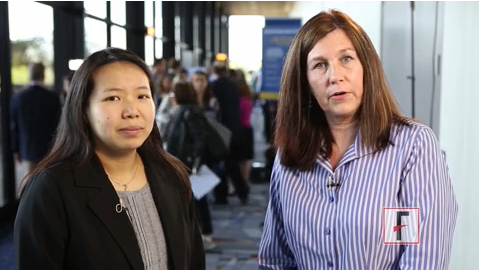User login
VIDEO: Investigational combo stalls progression in recurrent ovarian cancer
CHICAGO – Combining two oral investigational agents, cediranib and olaparib, significantly delayed progression in recurrent ovarian cancer from 9 months with olaparib alone to 17.7 months in a phase II study.
This is the first time this strategy of coupling a PARP (poly ADP ribose polymerase) inhibitor (olaparib) with an antiangiogenesis drug (cediranib) has ever been tested in a clinical trial for ovarian cancer.
If validated, the targeted drug combination could potentially provide women with recurrent ovarian cancer an alternative to standard chemotherapy, according to lead author Dr. Joyce F. Liu of Dana-Farber Cancer Institute, Boston.
We caught up with Dr. Liu at this year’s annual meeting of the American Society of Clinical Oncology, where the study was formally presented.
Dr. Liu reported having no financial disclosures. The study was supported by the National Cancer Institute and National Institutes of Health.
The video associated with this article is no longer available on this site. Please view all of our videos on the MDedge YouTube channel
CHICAGO – Combining two oral investigational agents, cediranib and olaparib, significantly delayed progression in recurrent ovarian cancer from 9 months with olaparib alone to 17.7 months in a phase II study.
This is the first time this strategy of coupling a PARP (poly ADP ribose polymerase) inhibitor (olaparib) with an antiangiogenesis drug (cediranib) has ever been tested in a clinical trial for ovarian cancer.
If validated, the targeted drug combination could potentially provide women with recurrent ovarian cancer an alternative to standard chemotherapy, according to lead author Dr. Joyce F. Liu of Dana-Farber Cancer Institute, Boston.
We caught up with Dr. Liu at this year’s annual meeting of the American Society of Clinical Oncology, where the study was formally presented.
Dr. Liu reported having no financial disclosures. The study was supported by the National Cancer Institute and National Institutes of Health.
The video associated with this article is no longer available on this site. Please view all of our videos on the MDedge YouTube channel
CHICAGO – Combining two oral investigational agents, cediranib and olaparib, significantly delayed progression in recurrent ovarian cancer from 9 months with olaparib alone to 17.7 months in a phase II study.
This is the first time this strategy of coupling a PARP (poly ADP ribose polymerase) inhibitor (olaparib) with an antiangiogenesis drug (cediranib) has ever been tested in a clinical trial for ovarian cancer.
If validated, the targeted drug combination could potentially provide women with recurrent ovarian cancer an alternative to standard chemotherapy, according to lead author Dr. Joyce F. Liu of Dana-Farber Cancer Institute, Boston.
We caught up with Dr. Liu at this year’s annual meeting of the American Society of Clinical Oncology, where the study was formally presented.
Dr. Liu reported having no financial disclosures. The study was supported by the National Cancer Institute and National Institutes of Health.
The video associated with this article is no longer available on this site. Please view all of our videos on the MDedge YouTube channel
AT THE ASCO ANNUAL MEETING 2014
